#MizzouResearch
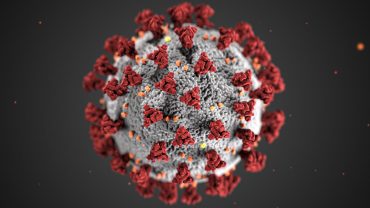
March 16, 2022
Competing with COVID: Researcher suggests varying from vaccines to fight virus
COVID-19 virus particles have spike proteins, represented in red, that attach to receptors on host cells. Antivirals block the receptors on host cells so the virus cannot infect more cells. | Creative Commons Photo By Cara Penquite | Bond LSC Vaccines were the light at the end of the tunnel throughout the COVID-19 pandemic, but virus mutations threaten to extinguish hope of a quick end to the pandemic. Kamlendra Singh turns towards antivirals as the next step. “There will be a time we will find an antiviral which will be very difficult for the virus to mutate…
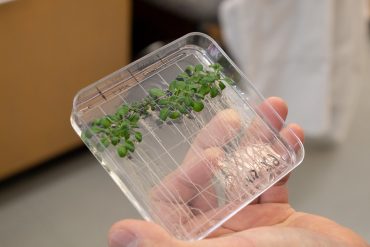
Feb. 24, 2022
Another piece of the pathway: Stacey lab identifies enzyme key to regulating plant metabolism
Researcher Sung-Hwan Cho holds mutant Arabidopsis thalianas. The Gary Stacey lab used these mutant variations to study how plants react to external stressors. | Photo by Karly Balslew, Bond LSC By: Karly Balslew | Bond LSC When we get hurt, our body signals our brain to warn us about stress and damage. We acknowledge the damage and then initiate the proper steps to heal. Plants may have different receptors that read these stress signals, but the process is similar. “When someone crushes the plant tissue, this triggers their immune system like us,” said Sung-Hwan…
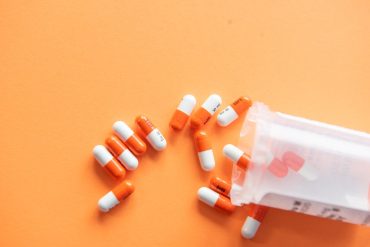
Feb. 9, 2022
Old Drugs, New Application: Artificial Intelligence Aid Future Breast Cancer Treatment
Photo by Christina Victoria Craft on Unsplash By Karly Balslew | Bond LSC New drug treatments take time and money to develop, especially with diseases as complicated as cancer. Developing a new drug to help cancer patients can take up to fifteen years and can cost roughly $1.6 billion, according to a paper published in the journal Cancers. With this in mind, researchers at the University of Missouri aim to capitalize on drugs that already exist. Using advanced computing, they are turning to FDA-approved drugs to repurpose, or reposition, for future cancer treatments. “The motivation…
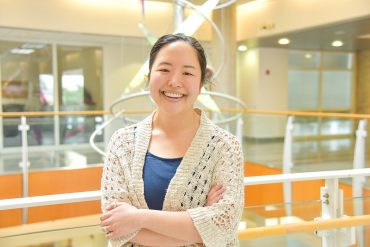
Aug. 5, 2021
Two SARS-CoV-2 strains cause independent infections only 19 days apart
Increasing detection of reinfections and rediscovering brand new infections within days raises concerns for herd immunity and the durability of vaccine efficacy. Cynthia Tang working to figure out how COVID-19 reinfections can bring us answers on how the virus is developing at Bond LSC. | photo by Davis Suppes, Bond LSC By Davis Suppes | Bond LSC Like many viruses, SARS-CoV-2 continues to develop and evolve with time. As the virus evolves it can become more infectious, produce worse symptoms, and have a higher fatality rate. While people receive more treatment for…

July 23, 2021
Bringing Protection Back in Line
Research refines platform to address immune disorders Dr. Esma Yolcu and Dr. Haval Shirwan, Co-pioneers of ProtEx technology By Davis Suppes | Bond LSC The things that protect you can also cause the most harm. That’s especially true when it comes to your immune system, which protects you against infections, but is also responsible for a host of diseases, including autoimmune disorders, such as type 1 diabetes. More than 1.4 million Americans suffer from the self-harming condition of diabetes without an effective cure, but researchers Haval Shirwan and Esma Yolcu may have the…
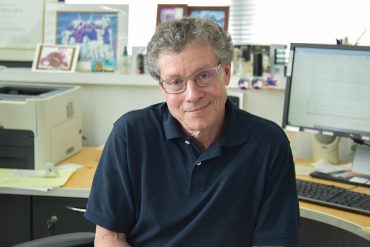
July 1, 2021
A scientist steps away from the bench
After 40 years of hard work, it is finally time for David Pintel to pass the torch. Dr. David Pintel, retiring after 40 years at Bond LSC, takes in his office during his last week at Bond LSC. | photo by Davis Suppes, Bond LSC By Davis Suppes| Bond LSC David Pintel is hanging up his lab coat after 40 years. “It’s been an honor to be able to do my work at the University of Missouri. I’ve had a great group of colleagues both here and at the medical school,”…
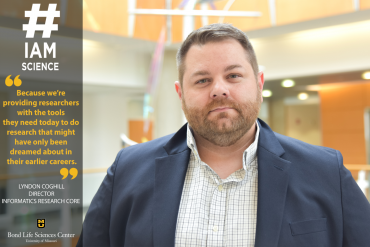
June 24, 2021
#IAmScience Lyndon Coghill
Lyndon Coghill is the new Director of Informatics Research Core, and he is already making big moves at Mizzou. Lyndon Coghill, Director of Informatics Research Core, stands near his office on June 22 at Bond LSC. | photo by Davis Suppes, Bond LSC By Davis Suppes | Bond LSC Lyndon Coghill’s official title may be Director of Informatics for the Informatics Research Core, but his job branches out much wider than just a single label. Even as an undergrad, Coghill wore many different hats. “I was incredibly excited about the way that the MU Office of…
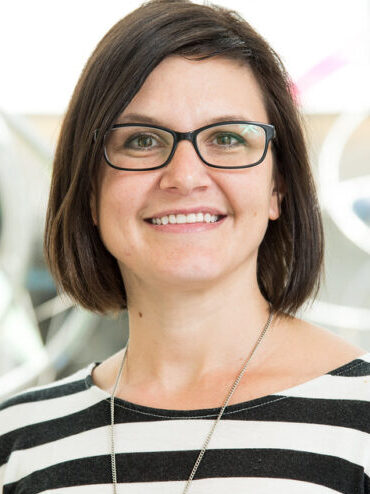
Oct. 16, 2019
Homegrown researcher
Years at MU lands student turned faculty tenure-track position Maggie Lange-Osborn is a newly appointed assistant professor in the Department of Molecular Microbiology and Immunology. | Photo by Roger Meissen, Bond LSC By Mariah Cox | Bond LSC Where can passion, hard work and more than a decade worth of experience get you? They landed Maggie Lange-Osborn her own research lab on the University of Missouri campus. Lange is starting down that path in Bond Life Sciences Center but will move to a permanent space in either the Medical Science Building or Schweitzer Hall eventually. She’s excited to…

Sep. 23, 2019
Beyond the visible: building a microscope that takes a quantum leap
Researchers from MU, the University of Maryland and the Pacific Northwest National Laboratory are building a microscope that doesn’t yet exist. Depending on their size, quantum dots emit different colors of light. By Mariah Cox | Bond LSC Tiny neon dots speckle a black backdrop – and no, this isn’t a Hasbro Lite Brite. Rather, these fluorescent dots indicate something about plants that scientists research and help them see the genes, traits and molecules they study amid thousands of possibilities. To help in seeing that, a new imaging microscope will allow researchers to better pinpoint molecular interactions in…
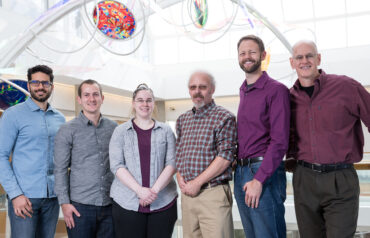
Sep. 3, 2019
University funding moves cancer-targeting research forward
Cross-collaborative research team looks to refine delivery of cancer treatments David Porciani, Josiah Smith, Leah Cardwell, Mark Daniels, Bret Ulery and Donald Burke | Photo by Roger Meissen, Bond LSC By Mariah Cox | Bond LSC “When you want to use a tool to do something in the house, you have to use the right size tool. It does no good to use a large screwdriver to fix the tiny screw on your glasses.” That’s Donald Burke, Bond Life Sciences Center lead primary investigator, as he begins to explain a project looking to optimize the targeting of cancer…
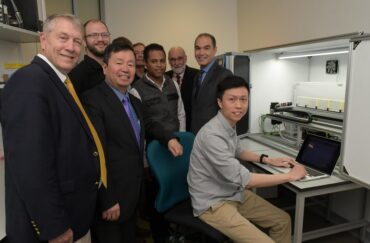
Aug. 16, 2019
Robots and Africa: Tech transfer accelerates data collection
Ke Gao and Sam McInturf reveal Sun Bear to presidents and administrators of UWC and MU. By Mariah Cox | Bond LSC Fourteen days. That’s how long it took Sam McInturf and Ke Gao to put together a root imaging machine named ‘Sun Bear’ at the University of the Western Cape in South Africa this past June. The pair, a postdoctoral researcher in the lab of Bond LSC’s David Mendoza and a computer science Ph.D. candidate, brought the automated approach to capturing data on root growth abroad as part of a technology transfer collaboration under…
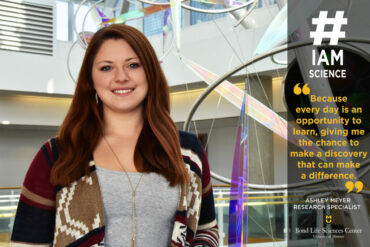
Feb. 8, 2019
#IAmScience Ashley Meyer
Mariah Cox | Bond LSC Situated in the Bond Life Sciences Center is an almost empty research lab on the fourth floor, which to some may look like an end but is really just a new beginning. Inside you may find a few boxes of gloves, a stack of brightly colored test tube racks and a sole thermocycler sitting on the lab bench. You’ll also find Ashley Meyer, the first researcher hired on by Wes Warren. “This is a brand-new lab. Dr. Warren came from Washington University in Saint Louis, and he didn’t bring anything with him…